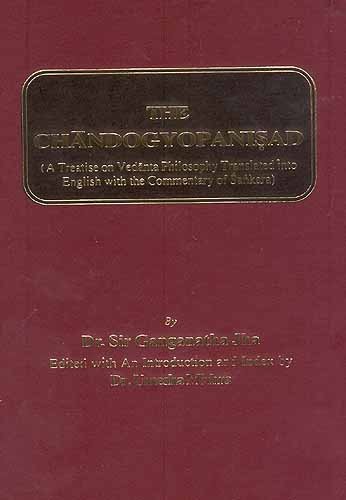Chandogya Upanishad (Shankara Bhashya)
by Ganganatha Jha | 1942 | 149,749 words | ISBN-10: 8170842840 | ISBN-13: 9788170842842
This is the English translation of the Chandogya Upanishad, an ancient philosophical text originally written in Sanksrit and dating to at least the 8th century BCE. Having eight chapters (adhyayas) and many sub-sections (khandas), this text is counted among the largest of it's kind. The Chandogya Upanishad, being connected to the Samaveda, represen...
Section 6.15 (fifteenth khaṇḍa) (three texts)
Upaniṣad text:
‘My dear, when a man is ill, his relatives assemble round him (and ask)—Do you know me ?—do you know me ?—so long as his speech has not become merged in Mind, Mind in Life-Breath, the Life-Breath in Fire and the Fire in the Supreme Deity,—he knows them.—(1)
Commentary (Śaṅkara Bhāṣya):
My boy, when a man is ill,—suffering from fever and other diseases,—his relatives assemble round him—when he is about to die,—and ask him—Do you know me—your father, a son, or brother (as the case may be).—of the dying man,—so long as speech has not become merged in mind, the mind in life-breath, and life-breath in fire, etc., etc., all which has been already explained.—(1)
Upaniṣad text:
‘Now, when his Speech becomes merged into mind, the Mind in Life breath, the Life-breath in Fire and Fire in the Supreme Deity,—then he does not know them’.—(2)
Commentary (Śaṅkara Bhāṣya):
The text now proceeds to show that manner of mergence into Being, of the Man with knowledge, is the same as that of the ordinary worldly man. When the Fire has become merged into the Supreme Deity, then he does not know them.
(The difference between the two men however is this)—As regards the Man without knowledge, having arisen out of Being, enters into them—pre-determined state of the tiger and other animals, or of deities, or men or other beings; whereas, the man with knowledge, having entered into Being—Brahman—Self-illumined by the lamp of knowledge derived from the teaching of Teachers and Scriptures,—never again returns to Birth; this being his manner of merging into Being.
Others, however, have held that the man, going out of the artery in the head, reaches Being through the Sun and other Deities.—This is not right. Because the progress after death of the Man (ego) is dependent upon the peculiarities of the notions of time, place and causes and of the motive for results; for one, however, who has recognised the Unity of the True-Self, and who has no other motive save Truth,—there can be no any such false notions as those of Time, Place, Causes or Motive for results; for the simple reason that the two are incompatible. Further, Ignorance, Desire and Kārmic Residua—which are the cause of the man’s progression,—are all burnt up by the Fire of True Knowledge, and hence, there can be no progressing (through the Sun etc. for the Man with knowledge); this has been thus described in the Ātharvaṇa text—‘for one whose all desires have been fulfilled and who has reached the Self,—all desires dis-appear in this life itself’.—(2)
Upaniṣad text:
‘That which is this Subtle Essence,—in that has all this its Self; that is True; that is the Self; that thou art, Śvetaketu.’—‘Revered sir, please explain this to me again.’—‘Be it so, my boy,’—he said.—(3)
Commentary (Śaṅkara Bhāṣya):
That which is etc., etc.—just as before.—“If, for the dying man and for the man going to be liberated,—for both, the mergence into Being be similar,—then, the man with knowledge, on merging into Being, does not return, while the Man without knowledge does return, (to worldly existence),—‘what is the reason for this?’—please explain this further to me by means of illustrations.’—‘Be it so, my boy’—he said.—(3)
End of Section (15) of Discourse VI
